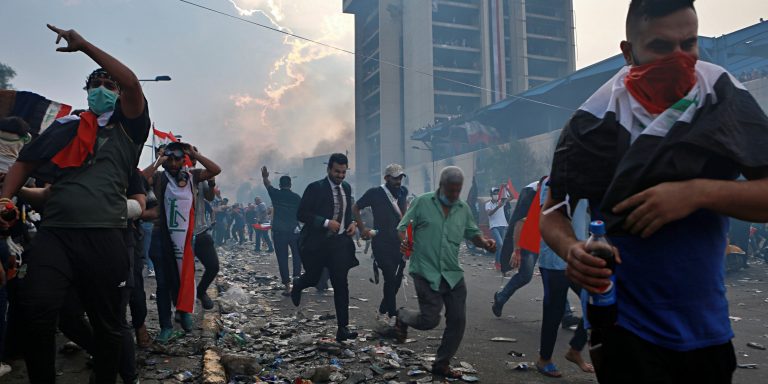INTELBRIEF
October 29, 2019
IntelBrief: Protesters Killed in Iraq as Demonstrations Intensify

- Dozens of protesters were killed in Iraq late last week, as anti-government demonstrations continued throughout the country.
- Iraqis have demonstrated civic solidarity in the protests, with older people joining younger protesters and a broader cross-section of society putting aside sectarianism and identity politics to join together.
- Clientelism and a bloated patronage system drive corruption and reinforce the perception that only the well-connected will gain access to economic opportunities.
- With the government and security forces focused on quelling domestic dissent, there will inevitably be fewer resources dedicated to combating the Islamic State.
.
Dozens of protesters were killed in Iraq late last week as anti-government demonstrations continued throughout the country. The Iraqi Commission on Human Rights reported that at least 60 people were killed throughout Iraqi cities over the past few days. Protesters clashed with security forces in what has been a continuation of demonstrations against rampant corruption, a lack of public services, unemployment, and an overall dearth of government transparency. Stores were shuttered, and in some cases, businesses were boarded up, in anticipation of escalating violence in Baghdad and other Iraqi cities. Curfews were enacted in Basra and Wasit. The protests initially began in early October but then seemed to stall after a violent crackdown by Iraqi security forces that resulted in over 150 civilian deaths. And while the government has promised to prosecute military and police officials involved in the killings, few Iraqis have faith in the judicial process.
In the most recent flare up of violence, Iraqi security forces fired water cannons, cannisters of tear gas, rubber bullets, and percussion grenades directly into crowds of protesters gathered at Tahrir Square. Some protesters were killed when they were hit directly by tear gas cannisters. Several dozen government buildings were attacked, with several of them set on fire. Thousands of people have been injured over the past few days in growing confrontations with police. Iraqi Prime Minister Adel Abdul Mahdi addressed the nation in a televised speech last Friday, in which he attempted to assuage the grievances of protesters and promised forthcoming reforms, including a special court to investigate corruption, job creation programs, and more accessible housing options. The Iraqi government also scheduled an emergency session in parliament to find a way through the current impasse. ‘Our soul, our blood, we sacrifice for you Iraq,’ was one of several popular refrains echoed by demonstrators as they marched in protest. Iraqis have demonstrated civic solidarity in the protests, with older people joining younger protesters and a broader cross-section of society putting aside sectarianism and identity politics to join together.
The current protests have been backed by Moqtada al-Sadr, an influential Shia cleric who maintains a large base of popular support throughout Iraq. But ethnic and sectarian brokers themselves remain part of the political dysfunction. In the landscape of Iraqi politics, voters typically elect politicians from their own ethnic or sectarian bloc, with the assumption that they will be the recipients of public sector jobs. Clientelism and a bloated patronage system further drive corruption and reinforce the perception that only the well-connected will gain access to employment and housing opportunities. Correcting the current system, which is deeply ingrained in Iraqi politics, is not something the Mahdi government seems likely to achieve given the long-term nature of such a challenge.
Some of the protesters were chanting anti-Iranian slogans while ridiculing Iranian General Qassem Soleimani, often seen as the architect of Iranian influence in Iraq and throughout the broader region. Iranian-backed Shia militias continue to jockey for power and influence in the country. The growing protests movement could not come at a more difficult time for Iraq, as the so-called Islamic State continues to look for ways to regenerate its networks in Iraq and across the border in neighboring Syria. With the government and security forces focused on quelling domestic dissent, there will inevitably be fewer resources and less effort dedicated to combating the Islamic State. This is just one of several areas where poor governance has a direct link to the pervasive challenge posed by terrorists, militias, and a host of other violent non-state actors.
.
For tailored research and analysis, please contact: info@thesoufancenter.org